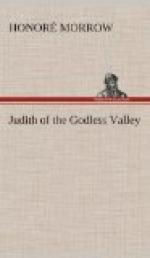But this, if not a day of what Lost Chief would call real adventure, was at least to be a day of episode. About mid-afternoon Doug heard the tinkle of a sheep-bell. He was not surprised, for he knew that he was well within sheep country. He followed the tinkle and came shortly to a wide draw where moved a mighty gray mass of sheep. The herder, on a bay horse, responded to Doug’s halloo with a wave of his hand. Douglas made his way round the edge of the draw and waited for the herder, who rode slowly up to meet him. Then he stared at the stranger’s gray-bearded face with the utmost surprise.
“Mr. Fowler!” he cried. “What are you doing out here?”
The older man, in shabby blue overalls and jumper, a black slouch hat pulled over his eyes, smiled grimly.
“You have the advantage of me, young man. I don’t remember your face.”
“I’m glad you don’t!” replied Douglas. “But I’ve always wanted to tell you I sure-gawd was ashamed of myself. I was the kid that made you trouble at Lost Chief seven or eight years ago.”
Fowler’s blade brows met as he studied the young rider’s frank face.
“So you are!” he said slowly. “So you are! Well, I’ll never have that kind of trouble again. Have you eaten? I’m late about dinner. Fact is, I get careless about my meals, living alone!”
“No, I’ve been out after wild horses and don’t plan to eat till I get back to camp ten miles yonder on the creek.”
“Better break bread with me,” suggested the preacher.
“That’s sure white of you. I don’t mind if I do.” Douglas returned Mr. Fowler’s grim look with one of wistful curiosity.
The preacher silently led the way to the sheep-herder’s wagon which perched on the peak of a hill above the draw. “I don’t have much to offer you but beans,” he said as they dismounted.
Douglas looked from the blood-stained gunny-sack to the clergyman’s deep-set eyes, hesitated, then said, “Beans are good and the sheep-man’s staple.” He followed into the wagon and sat on the edge of the bunk while Fowler prepared the frugal meal.
“Do you mind telling me,” asked Doug, “why you are herding sheep instead of folks?”
“I couldn’t earn a decent living herding folks. My wife died. I took anything that offered that would take me away from men and their accursed ways. There was something about sheep-herding that made me think of Jesus Christ and the country round about Bethlehem. I have found a kind of peace here.”
Douglas cleared his throat. “How long have you been at it?”
“A couple of years.”
“How was it you couldn’t earn a living, preaching?”
“It’s an age of unfaith,” replied the preacher.
“I don’t believe it’s, an age of unfaith.” Douglas puffed slowly on a cigarette. “That is, not like you mean. That Sunday, if you’d given us something we could have set our teeth in, we’d have listened to you. I remember distinctly, I sat down in the back of the room, saying to myself, ’Now if this old-timer has something interesting to say, I won’t let the kids in.’ But you—excuse me, Mr. Fowler—you just got up and bleated like a Montana sheep-man.”




